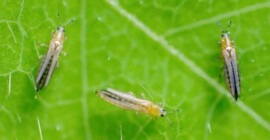I grew up in London’s Royal Parks (where my dad worked) and I’ve lived in three different houses set within these parks. The first two were close to Queen Mary’s Rose Garden, set right in the middle of Regent’s Park. It was here that I encountered roses for the first time, 30,000 of them to be precise.
This is why I have always loved roses, always grown roses, and always looked after my roses to the point of near obsession (according to my wife!)
But, horror, my roses got black spot. And mildew. And rust. And aphids. Even the most enthusiastic and devote of rose growers, such as the top people at the Royal National Rose Society, admit that roses can be some of the most problematic pest and disease-ridden plants in the garden. Aphids, this year, seem to be worse than the past few, and mildew has already gotten a hold on some of my climbers. On some plants, I’ve just handpicked the worst leaves and consigned them to the green recycling bin.
But as well as to control what you’ve already got, you should also prevent future infestations, and this is where Westland Rose Rescue comes into its own. I shall once again this year be spraying the most severely hit roses with it; it’s a combined insecticide and fungicide to control a whole host of rose nasties.
I spray in the evening and I also make repeat applications after 10 days to really knock the problem on the head. Then, after leaf fall in the autumn, I’ll make sure to rake up all the fallen leaves, and burn them (black spot disease has a tendancy to overwinter on fallen rose leaves.
Final tip – To give your roses the best fighting chance to ward off fungal problems you should also feed them handsomely. You have until the end of July to give yours a couple of feeds; after this time any new shoots resulting from a late feed won’t harden up properly before winter, and will be damaged by the cold. You can use a solid fertiliser such as Westland Rose Food Enriched With Horse Manure, or, to give a quick nutritional boost, you can water with diluted Gro-Sure Tomato Food. Both of these feeds are high in potash to keep plants blooming healthy!
Read more blog entries…



